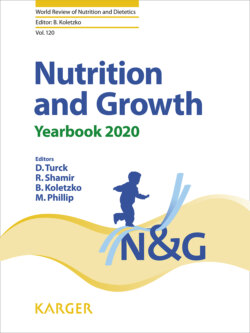Читать книгу Nutrition and Growth - Группа авторов - Страница 33
На сайте Литреса книга снята с продажи.
Duration of exclusive breastfeeding may be related to eating behaviour and dietary intake in obesity prone normal weight young children
ОглавлениеSpecht IO1, Rohde JF1, Olsen NJ1, Heitmann BL1–3
1The Parker Institute, Research Unit for Dietary Studies, Bispebjerg and Frederiksberg Hospital, Frederiksberg, Denmark; 2The Boden Institute of Obesity, Nutrition, Exercise and Eating Disorders, The University of Sydney, Sydney, Australia; 3Department of Public Health, Section for General Medicine, University of Copenhagen, Copenhagen, Denmark
PLoS One 2018;13:e0200388
Abstract: Infants who are breastfed are introduced to a variety of flavours from the maternal milk, and thus the transition from maternal milk to complementary foods may be easier for these children. The aim of this study was to investigate if duration of exclusive breastfeeding was associated with pickiness or dietary intake of vegetables, fruit, starchy foods or sugar sweetened beverages among obesity prone normal weight children aged 2–6 years. This cohort study was based on data from the Healthy Start primary intervention study, the Danish Medical Birth registry and the Danish Health Visitor’s Child Health Database. Infant feeding was registered by health nurses while home-visiting the mother and child up to 4 times within the first year. Information on eating behaviour and diet intake at age 2–6 years was obtained by parents. Crude and adjusted logistic and general linear regression models were used to investigate associations. A total of 236 children had complete information on all variables. Data showed lower odds of picky eating behaviour when exclusively breastfed until age 4–5 months compared to exclusively breastfed for 0–1 months (OR 0.35, 95 CI 0.16; 0.76, p = 0.008). In the crude analysis only, exclusively breastfed until age 6–10 months was associated with a higher daily intake of vegetables (p = 0.04). This study suggests that exclusive breastfeeding duration seems to influence pickiness and may contribute to facilitate the consumption of more vegetables in later childhood in obesity prone normal weight children.
Unmodified reproduction. This work is licensed under a Creative Commons Attribution 4.0 International License (https://creativecommons.org/licenses/by/4.0/deed.en)
| Comments | Food preferences by children are developed from early infancy. Infants who are breastfed are introduced to a variety of flavors from the maternal milk. Some studies have shown an association between duration of breastfeeding and a lower degree of pickiness in childhood.This observation is confirmed in this study, as there was a lower odd of picky eating behavior when exclusively breastfed until age 4 ± 5 months as compared to exclusively breastfed for 0 ± 1 month. Some studies have also suggested 6 months of exclusive breastfeeding, the WHO recommendation, to be a threshold for not developing pickiness [7]. The presence of picky eating behavior is relevant for future health as prolonged picky eating has been associated with the development of obesity. Due to the exposure to a variety of flavors, complementary feeding seems also easier for children being exclusively breastfed compared to formula-fed children.Some previous studies observed that children who were breastfed for a short duration or exclusively formula-fed infants tended to eat a less healthy diet in later childhood. In this study, exclusively breastfed until age 6 ± 10 months was associated with a higher daily intake of vegetables in the crude analysis, but not in the adjusted model. Contribution of breastfeeding to a high acceptance of vegetables consumption would be an important added value, as to increase vegetables intake later during childhood is one of the most difficult tasks in terms of eating behavior modification. |
______________________
